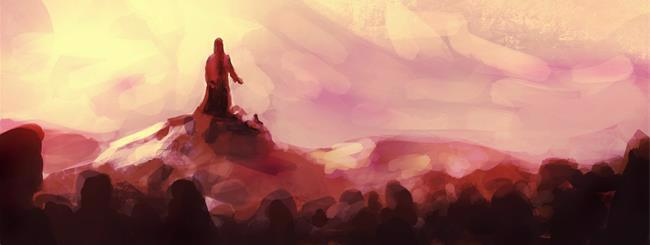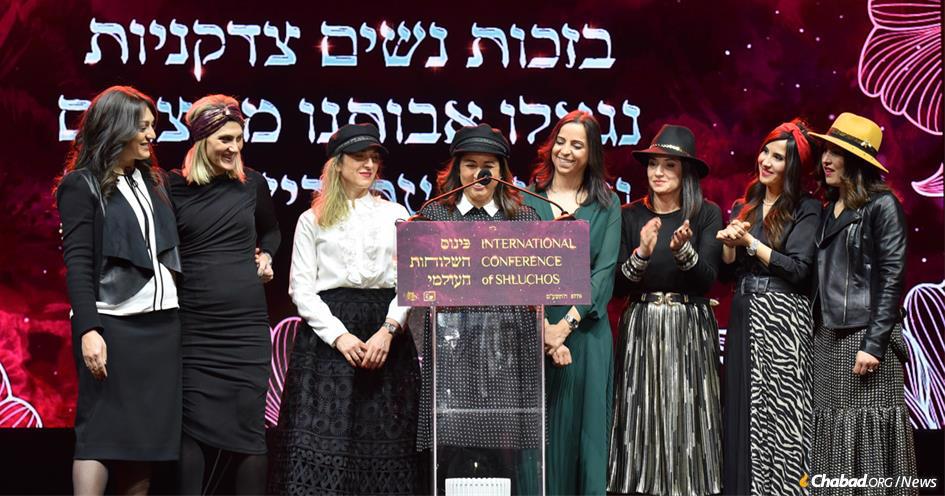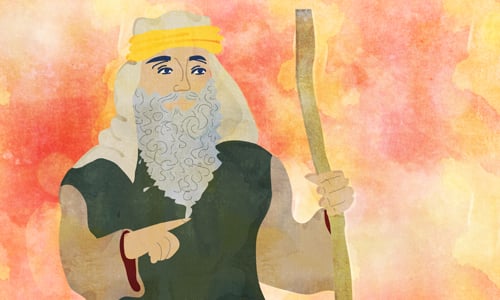 Rabbi David Etengoff Dedicated to the sacred memories of my mother, Miriam Tovah bat Aharon HaKohane, father-in-law, Levi ben Yitzhak, sister, Shulamit bat Menachem, sister-in-law, Ruchama Rivka Sondra bat Yechiel, Chana bat Shmuel, Yehonatan Binyamin ben Mordechai Meir Halevi, Tikvah bat Rivka Perel, Gittel Malka bat Moshe, Alexander Leib ben Benyamin Yosef, the Kedoshim of Har Nof, Pittsburgh, and Jersey City, the refuah shlaimah of Mordechai HaLevi ben Miriam Tovah, and the health and safety of our brothers and sisters in Israel and around the world. Parashat Chukat contains a mysterious passage that focuses upon a well: From there to the well, that is the well of which Hashem said to Moshe, “Gather the people, and I will give them water.” Then Israel sang this song: “Ascend, O well, sing to it! A well dug by princes, carved out by nobles of the people, through the lawgiver with their staffs, and from the desert, a gift.” (Sefer Bamidbar 21:16-18, this and all Bible and Rashi translations, The Judaica Press Complete Tanach) At first glance, it seems that this is an actual well, as Hashem said Moshe, “I will give them water,” an interpretation that Rashi (1040-1105) supports: “Then Israel sang this song, was said at the end of forty [years], but the well was given to them at the beginning of the forty [years].” In contrast, Rabbi Chaim ibn Attar (the Ohr HaChaim, 1696-1743), offers a strikingly different interpretation. In so doing, he maintains the well is not a well at all, instead, it is a metaphor for the Torah: It is possible that this shirah [is not to be taken as literally having been sung over a well. Instead, it] was said in regard to the Torah. Nevertheless, one ought not to view that generation’s song [to the Torah] as an indictment regarding those that did not sing such a new song when the Torah was given as a permanent possession [to the Jewish people at Mount Sinai]—when it would have been fitting and proper to sing just such a song of praise. For without a doubt, this song of the Torah wherein it is called “a well of water,” received [this appellation] because … the Torah is compared to water … (Translation and brackets my own) The Ohr HaChaim’s association of Torah with water is based upon the Talmudic expression, “ain mayim elah Torah” (“there is no use of the term ‘water’ that does not symbolize Torah’”): For it was taught: “And they went three days in the wilderness and found no water,” (Sefer Shemot 15:22) regarding which those who expound verses in an allegorical manner said: “water can only mean Torah,” as it says: “Behold! All who thirst, go to water [Rashi, water = Torah], and whoever has no money, go, buy, and eat, and go, buy without money and without a price, wine and milk.” (Sefer Yeshayahu 55:1) Therefore this means that when they went three days without Torah, they immediately became exhausted… (Talmud Bavli, Baba Kama 52a, translation, The Soncino Talmudwith my brackets and emendations) Sefer Bereishit 37:24 focuses upon the nature of the pit into which Yosef was thrown by his brothers, and once again, water plays a significant role: “And they took him and cast him into the pit; now the pit was empty there was no water in it.” Talmud Bavli, Shabbat 22a explains our pasuk in this manner: Rav Natan bar Manyumi taught in the name of Rav Tanḥum: What is the meaning of the verse that is written with regard to Joseph: “And they took him, and cast him into the pit; and the pit was empty, there was no water in it”? By inference from that which is stated: “And the pit was empty,” don’t I know that there was no water in it? Rather, why does the verse say: “There was no water in it?” The verse comes to emphasize and teach that there was no water in it, but there were snakes and scorpions in it. (Koren Talmud, Rabbi Adin Steinsaltz zatzal, editor) Initially, almost all of Yosef’s brothers sought to kill him, they settled, however, on tossing him into a pit, irrespective as to what dangers may have lurked therein. Their behavior toward Yosef ensured that the pit would be filled with snakes and scorpions, code words, in this instance, for blatant insensitivity and callousness. Little wonder, then, that “there was no water in it,” for when cold-heartedness reigns supreme, the Torah is pushed aside. May the time come soon and, in our days, when the prophet Yeshayahu’s words will be realized. For, then, at long last, Hashem will be recognized by the entire world as the Master of the Universe: Here is the G-d of my salvation, I shall trust and not fear; for the strength and praise of the Eternal Hashem was my salvation. And you shall draw water with joy from the fountains of the salvation. And you shall say on that day, “Thank Hashem, call in His Name, publicize His deeds among the peoples; keep it in remembrance, for His Name is exalted.” (12:2-4) V’chane yihi ratzon. Shabbat Shalom Past drashot may be found at my blog-website: http://reparashathashavuah.org. Please contact me at [email protected] to be added to my weekly email list. *** My audio shiurim on the topics of Tefilah and Tanach may be found at: http://tinyurl.com/8hsdpyd *** I have posted 164 of Rabbi Soloveitchik’s English language audio shiurim (MP3 format) spanning the years 1958-1984. Please click on the highlighted link: The Rav
0 Comments
6/18/2023 Parashat Korach 5783, 2023: "The Entire People Are Holy and Hashem is in Our Midst"Read Now Rabbi David Etengoff Dedicated to the sacred memories of my mother, Miriam Tovah bat Aharon HaKohane, father-in-law, Levi ben Yitzhak, sister, Shulamit bat Menachem, sister-in-law, Ruchama Rivka Sondra bat Yechiel, Chana bat Shmuel, Yehonatan Binyamin ben Mordechai Meir Halevi, Tikvah bat Rivka Perel, Gittel Malka bat Moshe, Alexander Leib ben Benyamin Yosef, the Kedoshim of Har Nof, Pittsburgh, and Jersey City, the refuah shlaimah of Mordechai HaLevi ben Miriam Tovah, and the health and safety of our brothers and sisters in Israel and around the world. In the context of his analysis of Korach’s rebellion, my rebbi and mentor, Rabbi Joseph B. Soloveitchik zatzal (1903-1993), known as “the Rav” by his students and followers, described Korach as “a demagogue motivated by selfish ambitions.” (Rabbi Abraham R. Besdin, Reflections of the Rav: Lessons in Jewish Thought, p. 140) Therefore, even though he was blessed with a prodigious intellect (Rashi, Commentary on the Torah to Sefer Bamidbar 16:7), tremendous wealth (Talmud Bavli, Pesachim, 119a and Midrash Shemot Rabbah 31:2), and all that was associated with such brilliance and affluence, this was simply not enough for Korach. He wanted everything. As such, when he was denied leadership of the tribe of Levi, having been passed over in favor of his cousin, Elitzafon ben Uziel (Midrash Tanchuma, Korach I), his demagoguery knew no bounds. The Ramban (Nachmanides, 1194-1270), in his Commentary on the Torah on our parasha, maintains that Korach did not immediately foment rebellion when he was denied leadership of the tribe of Levi. Instead, he strategically waited for the most auspicious time to begin his machinations. The Rav follows this interpretation of events, and notes: The opportune moment arrived sooner than Korach anticipated. It was the incident of the spies, perhaps the most tragic incident in Moses’ life. The Almighty’s decree that all the adults would die in the desert was a hard blow to Moses’ prestige. For a short while, he lost his influence over the crowds…Suddenly all their hopes and dreams were dissipated and shattered. No land, no conquest, no rivers of milk and honey, no realizations of the promise were in sight — only many bleak and dreary years before Israel would set foot on the soil of Canaan. (Rabbi Joseph B. Soloveitchik, Vision and Leadership: Reflections on Joseph and Moses, David Shatz, Joel B. Wolowelsky, and Reuven Ziegler editors, page 192) Many people generally familiar with Rav Soloveitchik’s thought are unaware that in 1924 he spent three semesters studying Political Theory and Science at the Free Polish University in Warsaw, Poland. This training provided him with the perfect background for understanding the nature and development of political movements. Little wonder, then, that he emphasizes the following notions in his analysis of Korach’s insurrection: Any conspiracy or organized rebellion, no matter how egotistically motivated, must develop an ideology to succeed. Korach planned an anti-Moses movement, and such a movement cannot exist or make headway without developing an ideology. Every movement must have a motto, and Korach indeed provided the philosophy of the rebellion. (Vision and Leadership, page 194) What exactly was the philosophical underpinning of Korach’s mutiny against Aharon and Moshe? The Torah underscores his position at the very beginning of our parasha: Korah, the son of Izhar, the son of Kohath, the son of Levi, took [himself to one side] along with Dathan and Abiram, the sons of Eliab, and On, the son of Peleth, descendants of Reuben. They confronted Moses together with two hundred and fifty men from the children of Israel, chieftains of the congregation, representatives of the assembly, men of repute. They assembled against Moses and Aaron, and said to them, “You take too much upon yourselves, for the entire congregation are all holy, and the L-rd is in their midst. So why do you raise yourselves above the L-rd's assembly?” (Sefer Bamidbar 16:1-3, translation, The Judaica Press Complete Tanach) Korach’s ideological thesis appears to be entirely accurate. Beyond a doubt, the entire congregation of the Jewish people is holy and Hashem is in our midst. This has been the case ever since we stood shoulder to shoulder as one united and chosen nation at Har Sinai and received the Torah. As the Rav writes: The basis of this challenge was very simple and, at first glance quite logical. No one can deny the assertion that the whole community is holy; it is the very essence of our choseness. Every Jew possesses intrinsic sanctity. As far as holiness is concerned, there is no distinction between Moses and a simple woodchopper. Hence, Korach asked, what right did Moses or Aaron have to lead, to guide, to rule? He charged them with seizing power illegitimately. He raised the millennial-old argument based on the equality of all people. (Vision and Leadership, p.194, underlining my own) Yet, while “no one can deny the assertion that the whole community is holy; it is the very essence of our choseness,” it is only part of the story of the kedushah (holiness) of the Jewish people. There exists another, equally vital component of the sanctity of our nation, namely, the kedushah of the individual: …Judaism was not satisfied with the social [i.e. collective] aspect of kedushah. If the community were the only source of sanctity, then the individual would be deprived of his creative role, his individual initiative, his originality and uniqueness. The outstanding person would not be able to develop into a great leader. Hence, the Torah says, there is a second resource of kedushah — the sanctity which the individual detects in the inner recesses of his personality…There is a separate kedushah attached to every individual. (Vision and Leadership, p.195, underlining and brackets my own) Precisely because “there is a separate kedushah attached to every individual,” Am Yisrael is infused with “the countless kedushah experiences of the individual members of the community.” In effect, “the single person sanctifies the community.” (Vision and Leadership, p.195, underlining my own) Korach’s refusal to recognize this fundamental component of kedushat Yisrael (the sanctity of the Jewish people) is precisely why he had the unmitigated gall to ask Moshe and Aharon, “Why do you raise yourselves above the L-rd’s assembly?” Once again, we may turn to the Rav’s penetrating explication: The statement by Korach that “All the community is holy” is correct as long as we are speaking of the community-rooted kedushah inherited from our ancestors. Indeed, “all the community,” the community as a whole is a source of holiness…However, if we shift our attention from the social aspect to the individual aspect of kedushah, the whole idea of equality turns into an absurdity. We must admit that the behirah [chosen nature] of Moses was above and beyond the behirah of the woodchopper or water-drawer. (Vision and Leadership, p.196, underlining my own) May we, as a people, recognize both the “community-rooted kedushah inherited from our ancestors,” and the unique sanctity that each and every one of us has to bring to our nation. Then, with the Almighty’s help, may we fulfill the Torah’s words: “And you shall be to Me a kingdom of princes and a holy nation” (Sefer Shemot 19:6), as we continue our sacred task l’takane ha’olam b’malchut Sha-dai—to perfect the world under the kingship of Hashem. V’chane yihi ratzon. Shabbat Shalom Past drashot may be found at my blog-website: http://reparashathashavuah.org. Please contact me at [email protected] to be added to my weekly email list. *** My audio shiurim on the topics of Tefilah and Tanach may be found at: http://tinyurl.com/8hsdpyd *** I have posted 164 of Rabbi Soloveitchik’s English language audio shiurim (MP3 format) spanning the years 1958-1984. Please click on the highlighted link: The Rav  Rabbi David Etengoff Dedicated to the sacred memories of my mother, Miriam Tovah bat Aharon HaKohane, father-in-law, Levi ben Yitzhak, sister, Shulamit bat Menachem, sister-in-law, Ruchama Rivka Sondra bat Yechiel, Chana bat Shmuel, Yehonatan Binyamin ben Mordechai Meir Halevi, Tikvah bat Rivka Perel, Gittel Malka bat Moshe, Alexander Leib ben Benyamin Yosef, the Kedoshimof Har Nof, Pittsburgh, and Jersey City, the refuah shlaimah of Mordechai HaLevi ben Miriam Tovah, and the health and safety of our brothers and sisters in Israel and around the world. At the beginning of our parasha, Hashem tells Moshe: “Send out for yourself men (shelach lecha anashim) who will scout the Land of Canaan, which I am giving to the children of Israel. You shall send one man each for his father’s tribe; each one shall be a chieftain in their midst.’” (Sefer Bamidbar 13:2, this and the following Tanach and Rashi translations, The Judaica Press Complete Tanach, with my emendations) Rashi (1040-1105), basing himself on Talmud Bavli 34b, notes that Hashem had no interest in sending these men to Eretz Yisrael. Instead, he merely allowed Moshe to do so: shelach lecha: “According to your own understanding. I am not commanding you, but if you wish, you may send. Since the Jews had come [to Moshe] and said, ‘Let us send men ahead of us,’ as it says, ‘All of you approached me…’” (Sefer Devarim 1:22) The concluding word in the phrase, “shelach lecha anashim,” also needs to be carefully analyzed. After all, who else, other than the anashim could Moshe have sent? The answer is deceptively simple: Moshe could have sent nashim(women). The origin of this idea is found in the Kli Yakar, the celebrated 16th century Torah commentary of Rabbi Shlomo Ephraim of Luntchitz (1550-1619): Another explanation as to why the Torah specifies “anashim”: Our Sages of blessed memory [Midrash Yalkut Shimoni,Parashat Pinchas] noted that the men despised the Land and declared: “Let us appoint a leader and return to Egypt.” (Sefer Bamidbar 14:4). [In contrast,] the women loved the Land and said: “Give us a permanent portion.” (27:4) Therefore, the Holy One Blessed Be He said: “According to My opinion, since I see what the future will bring, it is far better to send women that love the land for they will not speak about it in a disparaging and negative manner. But you, [Moshe], believe that these men are in fact fine and upstanding individuals (kesharim), and you believe that the Land is beloved to them—Go ahead and send men!” This is why when the Torah writes: “Send for yourself men,” [Rashi] interprets it as “According to your own understanding,” as for Me however, it would have been far better to send women... (Translation and emphasis my own) This amazing statement of Rav Luntchitz speaks volumes about the unique character of Jewish women. Remember, it was the Jewish women who refused to give up hope amid the misery and backbreaking labor of Egypt and encouraged their husbands, in kedushah and taharah (purity), to bring another generation of Jews into the world. Moreover, it was the Jewish women who steadfastly refused to participate in the Egel HaZahav (the incident of the Golden Calf). Little wonder, then, that it could have been the Jewish women who would have set the stage for our grand entrance into Eretz Yisrael, with Moshe as Mashiach, if they had only been given the opportunity! Shabbat Shalom Past drashot may be found at my blog-website: http://reparashathashavuah.org. Please contact me at [email protected] to be added to my weekly email list. *** My audio shiurim on the topics of Tefilah and Tanach may be found at: http://tinyurl.com/8hsdpyd *** I have posted 164 of Rabbi Soloveitchik’s English language audio shiurim (MP3 format) spanning the years 1958-1984. Please click on the highlighted link: The Rav  Rabbi David Etengoff Dedicated to the sacred memories of my mother, Miriam Tovah bat Aharon HaKohane, father-in-law, Levi ben Yitzhak, sister, Shulamit bat Menachem, sister-in-law, Ruchama Rivka Sondra bat Yechiel, Chana bat Shmuel, Yehonatan Binyamin ben Mordechai Meir Halevi, Tikvah bat Rivka Perel, Gittel Malka bat Moshe, Alexander Leib ben Benyamin Yosef, the Kedoshimof Har Nof, Pittsburgh, and Jersey City, the refuah shlaimah of Mordechai HaLevi ben Miriam Tovah, and the health and safety of our brothers and sisters in Israel and around the world. Parshiot Yitro and Beha’alotecha contain two versions of Yitro’s departure from klal Yisrael. The first is quite terse: “Moshe saw his father-in-law off, and he went away to his land (va’yalech lo el artzo).” (Sefer Shemot 18:27) The second, however, is far more expansive: Then Moshe said to Chovav the son of Reuel the Midianite, Moshe’s father-in-law, “We are traveling to the place about which Hashem said, ‘I will give it to you.’ Come with us and we will be good to you, for Hashem has spoken of good fortune for Israel.” He [Chovav=Yitro] said to him, “I won’t go (lo alech), for I will go (alech) to my land and my birthplace.” He [Moshe] said, “Please don’t leave us, as you are familiar with our encampments in the desert, and you will be our guide. And if you go with us, we will bestow on you the good which Hashem grants us.” (Sefer Bamidbar10:29-32, all Tanach translations, The Judaica Press Complete Tanach) The Midrash Mechilta on Sefer Shemot provides the backstory regarding what took place when Yitro left Moshe: And he [Moshe] said to him [Yitro]: “You have given us excellent advice [regarding the establishment of courts throughout klal Yisrael], and the Omnipresent one, Himself, has agreed to your plan, please do not abandon us.” And he [Yitro] responded to him [Moshe]: “Is it not the case that a small lamp will only be of value in a place that is dark? For, after all, this same small lamp will do absolutely nothing if it is placed between the [shining] sun and the [reflecting] moon. You, Moshe are the sun, and Aharon, your brother, is the moon. Therefore, what will the small lamp [that is, what can, I, Yitro,] do in your midst? Rather, behold, I will go to my land, and I will convert all the people in my country, bring them to talmud Torah, and bring them under the wings of the Schechinah…” (Mesechta d’Amalek II, translation and brackets my own) In sum, Yitro felt that he had given his personal best toward the advancement of klal Yisrael, and that the time had come for the luminaries of the Jewish people to fully shine their light upon the people. Moreover, he felt he could make an even greater contribution to advancing Hashem’s glory in the world by converting his nation, and thereby bring them tachat kanfei HaShechinah (under the divine protection of the Master of the Universe). In his Commentary on the Torah, the Alshich HaKadosh zatzal (Rav Moshe Alshich, 1508-1593) presents a different backstory than the Mechilta. In so doing, he provides an outstanding analysis of the previously cited verse in ourparasha: “I won’t go (lo alech), for I will go (alech) to my land and my birthplace: Even though Moshe never questioned his [Yitro’s] allegiance to the Torah, Yitro was concerned and said to himself: “Perhaps Moshe questions whether or not this is the end of me and thinks I have loosened my connection to Hashem’s Torah. Or, perhaps he thinks that even though I will remain strong in my emunah (faith), perhaps when I reside once again among the non-Jews, I will return to my [former] gods.” He [Yitro], therefore, set his [Moshe’s] mind at ease (literally, mareh lo hana’ah) and informed him that he would not abandon Hashem. According to the Alshich HaKadosh, Yitro subtly shared his true intentions with Moshe through the use of the words, “lo alech,” and “alech:” He said: “lo alech,” This meant, “I [Yitro] am only refraining and holding back from traveling with the Jewish people, and not, G-d forbid, [rejecting] the Torah, [for I remain a ger tzedek].” And regarding the second [potential concern of his son-in-law, Yitro said:] “But rather, only to my land and my birthplace alech (shall I go)—but not to my gods.” The Alshich HaKadosh brilliantly unpacks the meaning of lo alech and alech and reveals how these seemingly simple words were meant to dispel any conceivable fears Moshe may have had concerning Yitro’s unbreakable connection to the Torah and Hashem. May we, like Yitro, remain ever steadfast in our love of Hashem, and loyal to His holy Torah, wherever we may go. V’chane yihi ratzon. Shabbat Shalom Past drashot may be found at my blog-website: http://reparashathashavuah.org. Please contact me at [email protected] to be added to my weekly email list. *** My audio shiurim on the topics of Tefilah and Tanach may be found at: http://tinyurl.com/8hsdpyd *** I have posted 164 of Rabbi Soloveitchik’s English language audio shiurim (MP3 format) spanning the years 1958-1984. Please click on the highlighted link: The Rav |
Details
Archives
July 2024
AuthorTalmid of Rabbi Soloveitchik zatzal Categories |
- Blog: Rabbi David Etengoff: Parashat HaShavuah
- Sefer Bereishit 5784&5785
- Sefer Shemot 5784&5785
- Sefer Vayikra 5784&5785
- Sefer Bamidbar 5784 &5785
- Sefer Bereishit 5782&5783
- Sefer Shemot 5782&5783
- Sefer Vayikra 5782&5783
- Sefer Bamidbar 5782&5783
- Sefer Devarim 5782&5783
- Sefer Bereishit 5780& 5781
- Sefer Shemot 5780&5781
- Sefer Vayikra 5780&5781
- Sefer Bamidbar 578&5781
- Sefer Devarim 578&5781
- Sefer Bereishit 5778&5779
- Sefer Shemot 5778&5779
- Sefer Vayikra 5778&5779
- Sefer Bamidbar 5778&5779
- Sefer Devarim 5778&5779
- Sefer Bereishit 5776&5777
- Sefer Bereishit 5774&5775
- Sefer Bereishit 5772&5773
- Sefer Bereishit 5771&5770
- Sefer Shemot 5776&5777
- Sefer Shemot 5774&5775
- Sefer Shemot 5772&5773
- Sefer Shemot 5771&5770
- Sefer Vayikra 5776&5777
- Sefer Vayikra 5774&5775
- Sefer Vayikra 5772&5773
- Sefer Vayikra 5771&5770
- Sefer Bamidbar 5776&5777
- Sefer Bamidbar 5774&5775
- Sefer Bamidbar 5772&5773
- Sefer Bamidbar 5771&5770
- Sefer Devarim 5776&5777
- Sefer Devarim 5774&5775
- Sefer Devarim 5772&5773
- Sefer Devarim 5771&5770
 RSS Feed
RSS Feed
